Opinion
Cremation or Burial: Choice not by politics or religion
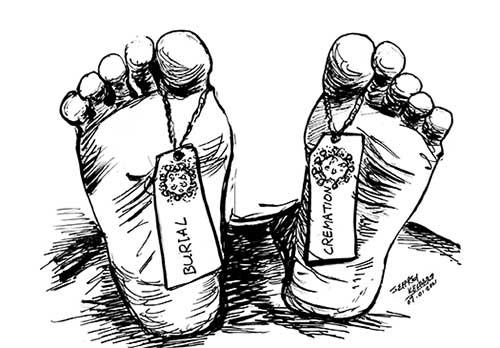
BY THARINDU DANANJAYA WEERASINGHE
The world recognizes that we deserve an honorable death. But, the honor of death does not depend on the manner in which the funeral is performed. Whether death is honorable or not depends on what we did and said during our lifetime. Of course, the dignity of death is determined not by how we die or by the moment of our death, but by how we lived.
Therefore, there are many religious, social and cultural rituals and customs associated with death. We know that they are unique to each society, to each religion, and to each culture. Sociological and anthropological research studies show that whatever the rituals and customs, they are established for the benefit and restraint of the living.
Religion prevents us from corruption; it establishes the good. Religion does not restrict human freedom; it awakens human thoughts. Therefore, we must make decisions based on the fact that ‘religion is for man; not man is for religion’.
Not all the decisions in a country should be made by politicians. There are decisions to be made by the officers. Artists have some decisions to make. There are decisions to be made by religious leaders. Also, some decisions have to be made by the people. When all the decisions in a country are made by politicians, everything in that country becomes chaotic. The government should not negotiate with politicians to resolve the issue of cremation of corona deaths in Sri Lanka. For that, the government should negotiate with relevant religious leaders.
Not everything in a country or a society is governed by law. Religion, culture, morality, tradition, etc., also play a role in governing a country. If the issue of the cremation of those who die of Covid-19 is a religious one, the solution must be found within the religion itself. If it is a cultural problem, solutions must be found in the culture concerned. If the cremation is forbidden by God’s order, what needs to be done at this moment is not to change the common law of the country, but to ask for God’s permission.
Verse 23:100 of the Holy Quran states that when a person dies, he has no connection with this world, and behind him is placed a vast screen invisible to the senses. Putting a screen between the dead and the world means that the dead will never know what the world is doing. So, the dead can do nothing for the living. “… the dead do not listen. The dead know nothing. The dead never answer. The dead do not know that they will be prayed to” (Verse 7:194 and 46:5 of the Holy Quran). The implication is that while religious healing of the dead and peace for the dead should be done, more attention should be given to the living.
According to Islamic tradition, the last rites of a dead person must be performed within 24 hours of the time of death. However, those religious leaders and devotees in Sri Lanka seem to have succeeded in obtaining the necessary divine permission to keep corona corpses in freezers for days and weeks, without violating that religious tradition and God’s wish. Therefore, it would be an easy task for religious leaders, communicating with God, to obtain God’s permission to cremate corona deaths.
If not, religious leaders will find solutions according to the teachings contained in the Holy Quran on what to do in such a confusing situation. Accordingly, we now face a strange kind of a test that tests the scientificity or ignorance of religious and philosophical teachings. The following are some of the religious teachings that can be considered in such a confusing situation, as stated in the Holy Quran, the purest religious textbook in Islam.
Verse 4:59 of the Holy Quran asks followers of Islam to obey Allah and His Messenger and obey those in authority. This verse says to obey Allah, to obey the Messenger and also to obey ‘Ulul Amru’. ‘Ulul’ means owners. ‘Amru’ means power or authority. Accordingly, ‘Ulul Amru’ means those who have power. In the rules of religion, one must obey Allah and His Messenger. But those in power must also be obedient in matters of administration that are not related to the teachings. Accordingly, it seems that it is not against Islam to accept and implement the provisions imposed by the ruler of a country, the authorities in various fields, judges and experts.
When one obeys God Allah and His Messenger, there can be no two positions as regards obedience and disobedience. However, at the end of this verse, it is said that when one obeys those in authority, one should obey only those things which do not contradict the Holy Quran. The verse further states that if there is any confusion in the obedience of those in authority, bring it to Allah and His Messenger. Moreover, the Holy Quran states that God Allah has approved the resolution of disputes between human beings when they arise, with the intervention of other human beings.
At a time when some politicians are misleading the people, this phrase is very helpful in protecting and awakening the people from such politicians. That is why we say that the situation regarding corona cremation or burial should be communicated to God, and the relevant religious parties in Sri Lanka should be empowered to resolve it religiously.
According to the Holy Quran, people are given the power to legislate in matters other than worship. There is nothing morally wrong in obeying the laws that man has made, using that power. But, if there is a conflict with that doctrine, then it must be communicated to God and get it resolved.
In countries where Muslims are a minority, a regime that enforces the rules of Islam cannot be established. Muslims living in countries where there are no Islamic rules in position, they should obey the rules imposed by the governing system of those countries. Also, when a Muslim is appointed as an employee or an official under such system, he/she should act in accordance with the law of the country, and not according to Islamic tradition. For example, if a Muslim who is a judge is found guilty of a crime, it should be judged and punished according to the law of that country. Verses 12:74 and 12:76 of the Holy Quran state that it is not a religious offense to do so. Accordingly, it is neither a religious offense for the fellow Muslims living in Sri Lanka to obey the laws of Sri Lanka, nor an opposition to Islamic tradition.
Allah only questions Islamic law in Islamic states. In countries without Islamic rule, it is not morally wrong to obey or enforce the law in that country. Therefore, in countries ruled by non-Muslims, it appears that it is not wrong to obey the rule and enforce it, other than those relating to worship. That is why complying with the regulations of the health authorities of Sri Lanka regarding corona cremation is not contrary to the will of God, or a disregard for religious teachings.
The World Health Organization (WHO) is of the view that this is a decision that should be specific and made by the corresponding country. This is the time for us to think more about environmental protection. It is a time when man himself experiences the consequences of overuse of the environment and environmental resources. We now have to choose between the two. Either death must be chosen, or life must be chosen. Either way, it depends on the extent of environmental protection. Thus, many countries around the world seem to have environmental protection at the top of their national agenda. Whether we die or live, we must think about the environment. Our lives have become a nuisance to the environment. Our death should not harm the environment either.
Below-mentioned is a part of the historic speech made by the Vedda leader of Sri Lanka; Uruwarigaye Vanniyalathoo, addressing the World Climate Change Conference in 2014.
“…The customs and traditions were forgotten by later generations. They began to embrace what they received from animals, the jungle, the sun, the rain, and the wind. The earth was fenced-off. The trees were cut down relentlessly. In one day, a countless number of visible and invisible animals were killed. People call that nonsense ‘development’…
…It rained just in time before these things made people’s heads go crazy. It felt like the wind was blowing at the right time on the right day. We looked at the environment and made predictions. We adjusted our lives accordingly. But today? It doesn’t rain when it needs to rain. The wind is not blowing at the right time. The mountains are falling down. The sea is rising. Rivers are overflowing. Getting sick without even knowing it. These are not surprising things. These are the reactions to the destruction that people have done to the environment so far…”
Environmental protection should also be at the top of the agenda to be implemented in the face of corona deaths. It should be in the opinion of the experts who have studied scientifically what is happening to the groundwater layer of Sri Lanka by burying the corona bodies. It cannot be determined by political or religious ideology or by what other countries are doing. If the burial of those who die of Covid-19 contaminates groundwater, then it will amount to the sacrifice of God for God, for Nature is also considered God.
Appropriately, the easiest solution for religious leaders is to pray to their God and seek God’s permission to cremate the dead. The permission will surely come from God, the embodiment of love and kindness.
(The writer is a senior university lecturer. Views are personal.)
Opinion
Learning from global models to address flooding and water shortage in Sri Lanka

by Sudharman Siripala
Sri Lanka is grappling with the increasing threat of climate change, which has led to unpredictable weather patterns. The country faces a dangerous combination of flooding in some regions and water shortages in others, a situation exacerbated by shifting rainfall patterns. Rivers originating in the Central Hills, such as the Mahaweli, Kalu, and Kelani, flow through much of the country, but these water sources are not being distributed evenly. Districts like Monaragala and Hambantota, located in the dry zone, are experiencing severe water shortages. To address this challenge, experts suggest the development of an interconnected river system to harness excess water during floods and redirect it to drier areas, ensuring a year-round water supply for agriculture and daily use.
Global Case Studies in River Management
Several countries facing similar water-related challenges have implemented successful water management systems that Sri Lanka could adapt to its unique circumstances:
The Netherlands – Room for the River Programme
The Netherlands, a country prone to flooding, widened its rivers and relocated dikes to create floodplains. This approach allows rivers to overflow without damaging urban areas, while preserving water flow and natural habitats. Sri Lanka could apply this concept by designating specific riverbank areas for temporary flood storage.
China – South-North Water Transfer Project
China’s massive project channels excess water from the flood-prone Yangtze River to drier northern regions. This system of canals and reservoirs could inspire Sri Lanka to divert water from rivers in the Central Hills to drier areas in the south and east.
Bangladesh – River Interlinking Projects
Bangladesh has implemented river interlinking projects to redistribute water from flood-prone rivers, such as the Brahmaputra, to drier regions. Sri Lanka could link its major rivers like the Mahaweli and Kelani to smaller rivers in water-scarce districts to balance water distribution.
India – National River Linking Project
India’s National River Linking Project connects major rivers to manage both floods and droughts. Sri Lanka could use similar strategies, connecting rivers around the 500-foot contour line in the Central Hills to help distribute water more effectively.
United States – Mississippi River and Tributaries Project
The Mississippi River system combines levees, floodways, and diversion channels to manage flooding. Sri Lanka could adopt similar flood-control measures in vulnerable river basins such as the Kelani and Kalu.
Japan – Underground Reservoirs and Flood Channels
Japan’s G-Cans Project in Tokyo channels excess water into underground reservoirs to prevent urban flooding. A similar underground system could be implemented in Colombo and other flood-prone cities in Sri Lanka.
Singapore – Marina Barrage
Singapore’s Marina Barrage serves as both a flood control measure and a water supply resource. Sri Lanka could develop similar systems to control flooding in urban areas and ensure water availability during dry spells.
Thailand – Chao Phraya River Basin Management
Thailand uses diversion channels in the Chao Phraya River Basin to prevent flooding in Bangkok and direct water to agricultural areas. Sri Lanka could replicate this by creating diversion channels to supply water to its agricultural zones.
Actionable Solutions for Sri Lanka
Develop an Interconnected River System
Establish water diversion channels along the 300-500 meter contour lines of the Central Hills to capture excess rainfall during floods and redirect it to drier areas.
Build Reservoirs and Storage Tanks
Construct reservoirs to store diverted water, ensuring a steady supply for agriculture and domestic use. Sri Lanka has around 14,000 ancient tanks out of 30,000 that could be revitalized for this purpose.
Improve Urban Flood Defenses
Drawing inspiration from Japan and Singapore, build underground reservoirs and flood channels in cities like Colombo to mitigate urban flooding.
Strengthen Watershed Management
Restore natural floodplains and create wetlands to absorb excess rainwater, as seen in the Netherlands, helping to reduce flood risks.
Encourage Public-Private Partnerships
Foster collaboration between the public and private sectors to fund large-scale water management infrastructure, leveraging models from China and the United States.
Leverage Technology
Utilise modern forecasting and real-time water management systems, similar to those in Bangladesh and Thailand, to monitor water levels and manage river flows dynamically.
International Collaboration
Form partnerships with countries that have successfully implemented flood control and water management systems to share expertise and technology.
Sri Lanka’s dual challenges of flooding and water scarcity, compounded by climate change, require immediate action. By developing an interconnected river system and learning from successful global water management models, Sri Lanka can mitigate the effects of floods while ensuring a sustainable water supply for agriculture and daily life. It is crucial for the country to act now, as these solutions have the potential to transform Sri Lanka’s water management system for the better.
Sudharman Siripala Managing Director of Geoinformatics Group and a Registered Licensed Surveyor, specializes in geo-spatial applications. He also serves as a freelance value chain consultant for Vivonta Green Tech Consultants (www.vivonta.lk)
Opinion
Doctor’s plight

Some people have found fault with a female doctor for not coming forward to identify her rapist and help make him pay for his crime.
Do they not realise the emotional toll of facing her rapist again?
There should be a way for survivors to testify directly to the judge without enduring such distressing encounters. Making a victim relive her trauma in this manner is akin to subjecting her to the ordeal all over again.
A Ratnayake
Opinion
Developing attitudes of schoolchildren for development
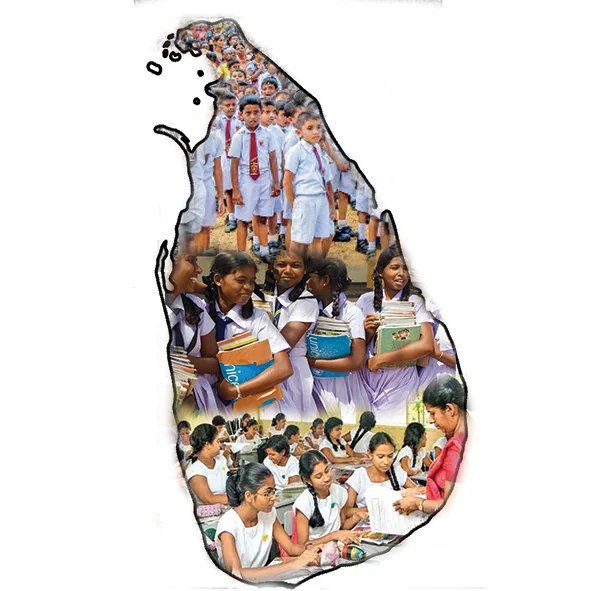
Sri Lanka was once at an economically comparable level with some of the world’s most developed countries in the 19th century. However, despite our country’s potential, we are still striving to fully develop. Many people often blame politicians, government officers, or various sectors for the situation. However, I believe the root cause of these issues lies not in any individual or group, but in the lack of good attitudes within our society.
We are investing significant resources into our education system, which is funded by the taxes of hard- working citizens. However, when we examine the outcomes, we realise that the academic achievements of our graduates alone are not enough. There are instances where professionals, despite having the necessary qualifications, fail to uphold ethical standards. In some cases, this even results in malpractice or harmful actions that damage our country’s reputation and progress. This highlights the gap between academic success and real-world responsibilities.
The education system, which is currently focused on competitive exams and rote learning, does not emphasise the development of attitudes and character in students. While our students are academically capable, many lack the qualities required to contribute positively to society. This lack of focus on social values, such as patriotism, selflessness and respect for elders, is holding us back from achieving the level of progress we deserve.
To address these concerns, I wrote to His Excellency, the President of Sri Lanka, on 24th September 2024, proposing education reforms that emphasise not only academic qualifications but also attitudes, ethics, and social responsibility. I suggested a holistic approach to university admissions and government recruitment, incorporating moral integrity, character, and extracurricular involvement, key traits for fostering well- rounded, responsible citizens. More importantly, I strongly recommended introducing a compulsory school subject, with both theory and practical components, focused on attitude development, which would be evaluated in university admissions. Encouraging extracurricular participation alongside academics will help shape ethical and socially responsible individuals.
I am pleased to inform you that the President, recognising the importance of these reforms, has directed the relevant ministries (by a letter dated 24th October 2024) to explore integrating these ideas into the education system. This marks a crucial step in transforming the values and attitudes of our youth for the nation’s benefit.
However, meaningful change requires collective effort. Parents, teachers, students, and citizens all play a role in shaping Sri Lanka’s future. Together, we must instill responsibility, ethics, and patriotism in the next generation. I invite you to share your thoughts and suggestions on further enhancing the values and attitudes of our youth. Your feedback will be invaluable in building a brighter future for Sri Lanka, one driven not just by knowledge, but by integrity and character.
Dr. Mahesh Premarathna
Research Fellow, National Institute of Fundamental Studies, Sri Lanka Email: mahesh.pr@nifs.ac.lk
-

 News7 days ago
News7 days agoSeniors welcome three percent increase in deposit rates
-

 Features7 days ago
Features7 days agoThe US, Israel, Palestine, and Mahmoud Khalil
-
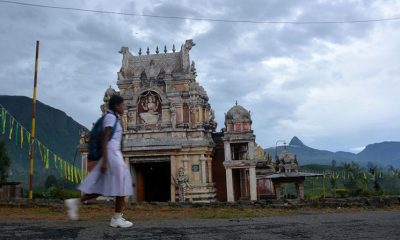
 News7 days ago
News7 days agoScholarships for children of estate workers now open
-
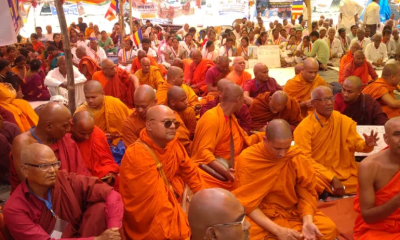
 Foreign News5 days ago
Foreign News5 days agoBuddhism’s holiest site erupts in protests over Hindu ‘control’ of shrine
-
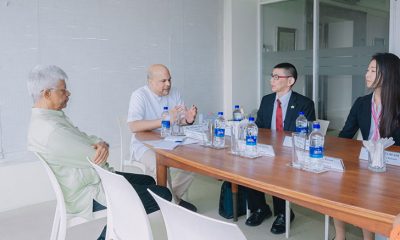
 News7 days ago
News7 days agoJapanese Defence Delegation visits Pathfinder
-

 Features4 days ago
Features4 days agoCelebrating 25 Years of Excellence: The Silver Jubilee of SLIIT – PART I
-

 Editorial6 days ago
Editorial6 days agoWhen tractors become cars!
-

 Business2 days ago
Business2 days agoAIA Higher Education Scholarships Programme celebrating 30-year journey











